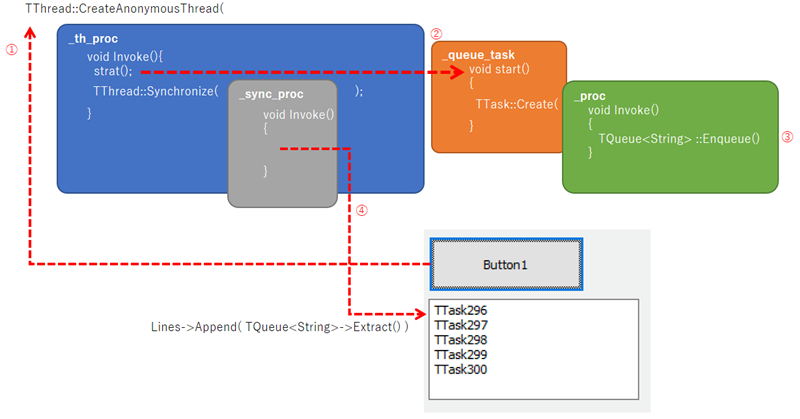When considering migration from old C++Builder 10.2 Tokyo bcc32 project.
You can use functions such as TThread::CreateAnonymousThread() and TTask to improve performance.
In addition to TCriticalSection, you can also use System.TMonitor which supports multiple devices.
I will show you how to program bcc32 project using the above method.
TQueue<String> is created in Delphi.
TQueue<T> is in System::Generics::Collections.
To use TQueue<String>, describe it in Delphi as follows.
uses System.Generics.Collections; type TQueStr = class(TQueue<String>) endYou can now use
TQueue__1<System::UnicodeString>.Create a class to run in the interior of the
TTask.//_proc is a struct to execute TTask::start(). struct _proc: TCppInterfacedObject<TProc> { TQueue__1<System::UnicodeString>* f_queue_; TObject* f_mutex_; //TObject behaves like a mutex. int f_number; _proc(int i, TObject* lmtx, TQueue__1<System::UnicodeString>* lq):TCppInterfacedObject<TProc>(){ f_mutex_ = lmtx; f_queue_ = lq; f_number = i; //This is the number where the Task is executed. } //Convert from int to string. std::string int_to_string(const int i) { std::ostringstream ss; ss << i; return ss.str(); } //Executed in TTask. void __fastcall Invoke(){ std::string s = "TTask" + int_to_string(f_number+1//Lock with TMonitor. System::TMonitor::Enter(f_mutex_); try { //Add a character to the common TQueue<String>. f_queue_->Enqueue(s.c_str()); //Sleep(100); } __finally { //UnLock with TMonitor. System::TMonitor::Exit(f_mutex_); } } inline __fastcall virtual ~_proc(void){ } };Actually executed is
void __fastcall Invoke(){}.
The internal in the task memory each other will use theSystem::TMonitor::Enter(f_mutex_);so as not to conflict.It is a class that creates many
TTasks.We have created and stored many
TTasks instd::vector<_di_ITask>.struct _queue_task { TQueue__1<System::UnicodeString>* f_queue; TObject* f_mutex; //TObject behaves like a mutex. std::vector<_di_ITask> v1; //_di_ITask is managed with std::vector. _queue_task(){ f_queue = new TQueue__1<System::UnicodeString>(); f_mutex = new TObject(); } std::vector<_di_ITask>& start(const int icount) { // Only the number of purpose, to create a TTask. for (int li = 0//The TTask is _proc::Invoke() is executed. v1.push_back(TTask::Create(_di_TProc( new _proc(li, f_mutex, f_queue)))); } for (std::vector<_di_ITask>::iterator tsk = v1.begin(); tsk != v1.end(); ++tsk) { //Start the TTask in the std::vector in order. (*tsk)->Start(); } return v1; } virtual ~_queue_task() { //Destructor delete f_queue; delete f_mutex; } };Using
TThread::CreateAnonymousThread()etc., the design method as shown below is also possible.
